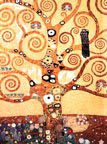
(I just liked this picture)
What is it lately with the odd books? Maybe it's the source of recommendation: I got this one off Dark Carnival's recommended list as well.
A sort of gothic English-manor mystery, this was short, entertaining book that had no central plot that I could discern. Or rather, it did not move in a linear line, plot-driven. Rather, it moved in circles, making it very difficult to keep track of the order of events. This is due to the fact that our narrator, Sir Hugo Coal, lord of Crook Manor, had a 'cerebral accident' and is, according to the doctors, a vegetable. So you can see how the storyline might be a bit unusual.
Sir Hugo tells us that he is *not* a vegetable -- he is simply paralyzed and unable to interact with the world. However, his mental faculties are perfectly intact, thank you very much. Thus, he is able to observe the deterioration of his family as the evil (so it would seem) butler, Fledge, usurps Hugo's place in the house bit by bit.
Or is he? Hugo is an unreliable narrator, and throughout the novel it is unclear which exactly are his suspicions as opposed to facts; which are his interpretations of events as opposed to events we can count on.
The story Hugo presents is this: his wife hires Mr. and Mrs. Fledge to be household servants. Mrs. Fledge soon reveals herself to be a mousy alcoholic. Fledge is a butler with intent to be a master. He slowly begins to set in motion a series of events which puts the household in ruins. Hugo's daughter, Cleo, is completely undone after her fiancee, Sidney, is found murdered in the bog. Who murdered him? And why? Is Fledge a homosexual? Is Hugo simply a creep? Is any of this happening at all?
Extremely gothic with bits of frank sexuality and mysterious meandering paths of thought, this was a fun novel to read and perfect for taking to the bathtub to enjoy (which I did a number of times). Although, it never really coagulated into anything particularly coherent, which, upon reflection, is okay. It was very enjoyable if you like sort of dark, rainy, gothic murder mysteries with a twist (which apparently I do).
A funny thing: it took me until at least halfway through the book to figure out when it was set. I got inklings that it was not Victorian, although what with all the talk of servants and English manors and tweeds, it was hard to tell. Finally the clues came and I was able to place the time in the late 1940s. I'm not sure if this was intentional or not, but I thought it was kind of funny that stuffy English gothic novels are somewhat timeless. As long as there's rain, some tweeds, and a butler (who might have done it), it doesn't matter if it's 1840 or 1940.
What's next? I think Hotel Translyvania.








No comments:
Post a Comment